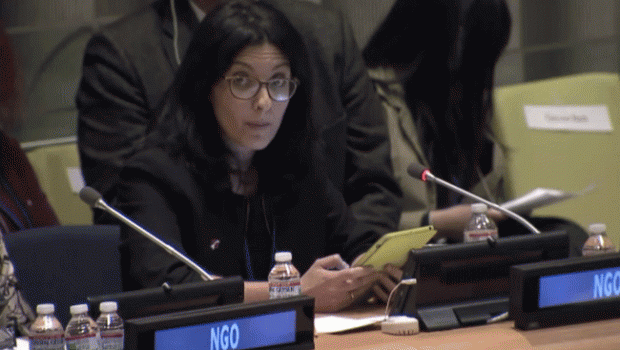The humanitarian initiative began here five years ago, when the NPT Review Conference expressed its deep concern at the catastrophic humanitarian consequences of nuclear weapons. Since then, a fundamental shift has been under way. Concerns about the impact of nuclear weapons on people and the environment have become central to disarmament discussions.
There is a new sense of empowerment among the peoples and the governments of countries that reject nuclear weapons. There is a new sense of discomfort among the governments of nuclear-armed states and their allies. There is a new and growing expectation that negotiations are going to begin in the near term on a legally binding instrument to ban nuclear weapons. So, in one way, we are greatly encouraged by the progress since governments last gathered in this format in 2010.
Unfortunately, the states that wield nuclear weapons have not kept pace with this progress. On the contrary, they have protested every step of the way that the humanitarian initiative is a distraction from what they see as the real work of nuclear disarmament. They have protested that such discussions should not take place without them, while initially choosing to stay away from the meetings themselves. This opposition has been revealing.
It reveals a concern that discussions about the unacceptable consequences of nuclear weapons will inevitably lead to their international prohibition. It reveals a concern that the relentless multi-billion dollar modernisation of nuclear arsenals is being exposed through international discussions. It reveals a concern that an initiative is emerging and can move forward even without the nuclear-armed states.
This is our main message today – that we can and we must move forward with a ban, with or without the nuclear-armed states. There is an opportunity before us – as an international community – to prohibit nuclear weapons. We should not let it slip through our hands. We should not accept a framing that such a prohibition is impossible. It is not. It is already clearly under discussion, it is consistent with the disarmament goals and principles of the NPT and with the broader development of international law, and it is coming.
We should not accept a framing that such a prohibition would make no difference. The fact that the nuclear-armed states oppose it should tell us that it’s a meaningful pursuit that will challenge their possession of nuclear weapons. We should not accept a framing that such a prohibition is polarising or divisive. Adopting a new international legal standard to prohibit nuclear weapons is a responsibility.
Not all states will join at the same time. That is not divisive, that is the nature of international agreements. Those who oppose negotiations towards a ban on nuclear weapons are in danger of giving support to the nuclear-armed states in their efforts to control the discourse on nuclear weapons. The world is now well set to begin these negotiations. The focus on the humanitarian impact of nuclear weapons is the right starting point. It leads directly to a conclusion that prohibiting nuclear weapons is the right next step.
The pledge that so many governments have made to fill the legal gap on the prohibition and elimination of nuclear weapons has demonstrated clearly the willingness of states to start work on a new legally binding instrument. The focus on effective measures here at the NPT, is an expression of that work towards a legally binding instrument. Negotiations should commence this year – the year which marks the 70th anniversary of the atomic bombing of Hiroshima and Nagasaki. The ban treaty and the process of work to put it in place will not immediately solve all the problems with nuclear weapons. Nor are these efforts meant to replace the work to reduce nuclear arsenals and maintain dialogue among nuclear-armed states on disarmament. All of these efforts must intensify. They are not mutually exclusive, but mutually reinforcing.
The ban treaty has an irresistible logic. We can see already from the statements here this week that many states are embracing that logic and signalling a clear determination to act upon it. Through our campaign partners in 95 countries, ICAN will be there to support states through these negotiations every step of the way.
So let’s start.










